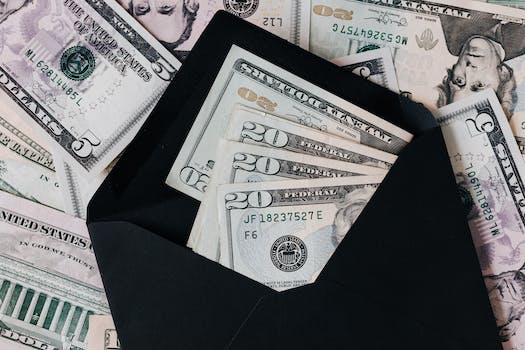How To Save Money Budget
Introduction

Introduction: Saving money is an essential aspect of financial planning. It helps you to achieve your financial goals and secure your future. Budgeting is an effective way to save money and manage your finances. In this article, we will discuss some tips on how to save money budget.
10 Simple Ways to Cut Your Monthly Expenses
Saving money is a goal that many people have, but it can be difficult to know where to start. One of the best ways to save money is by cutting your monthly expenses. Here are 10 simple ways to do just that.
1. Create a budget
The first step to cutting your monthly expenses is to create a budget. This will help you see where your money is going and where you can make cuts. Start by listing all of your monthly expenses, including rent/mortgage, utilities, groceries, transportation, and entertainment. Then, compare your expenses to your income and see where you can make adjustments.
2. Cut back on eating out
Eating out can be a major expense, especially if you do it frequently. Try to limit your restaurant visits to once a week or less. Instead, cook at home and pack your lunch for work. Not only will this save you money, but it can also be healthier.
3. Cancel subscriptions
Do you have subscriptions to magazines, streaming services, or other monthly services that you don’t use? Cancel them. You can always sign up again later if you miss them, but for now, cutting them out can save you money.
4. Use coupons and discounts
Before making any purchase, check for coupons or discounts. You can find them online, in newspapers, or through loyalty programs. Even small discounts can add up over time.
5. Shop around for insurance
Insurance can be a major expense, but you may be able to save money by shopping around. Get quotes from multiple providers and compare coverage and prices. You may be able to find a better deal.
6. Use public transportation
If you live in an area with public transportation, consider using it instead of driving. This can save you money on gas, maintenance, and parking. Plus, it’s better for the environment.
7. Cut back on energy usage
Reducing your energy usage can save you money on your monthly bills. Turn off lights and electronics when you’re not using them, use energy-efficient light bulbs, and adjust your thermostat to save on heating and cooling costs.
8. Buy generic
When shopping for groceries or household items, consider buying generic brands instead of name brands. They are often just as good, but cost less.
9. DIY
Instead of paying for services like cleaning or lawn care, try doing it yourself. You can save money and get some exercise at the same time.
10. Sell unused items
If you have items around your home that you no longer use, consider selling them. You can use online marketplaces like eBay or Facebook Marketplace to sell items and make some extra cash.
By implementing these 10 simple tips, you can cut your monthly expenses and save money. Remember, every little bit counts, so even small changes can make a big difference over time.
Creating a Realistic Budget: Tips and Tricks
Saving money is a goal that many people have, but it can be difficult to achieve without a solid plan in place. One of the best ways to save money is by creating a budget. A budget is a plan that outlines your income and expenses, and helps you to manage your money more effectively. In this article, we will discuss some tips and tricks for creating a realistic budget that will help you save money.
The first step in creating a budget is to determine your income. This includes any money that you earn from your job, as well as any other sources of income such as rental income or investment income. Once you have determined your income, you can then move on to determining your expenses.
When determining your expenses, it is important to be as thorough as possible. This means including all of your regular expenses such as rent or mortgage payments, utilities, groceries, transportation costs, and any other bills that you have. It is also important to include any irregular expenses such as car repairs or medical bills.
Once you have determined your income and expenses, you can then create a budget. This involves subtracting your expenses from your income to determine how much money you have left over each month. This leftover money can then be used for savings or other financial goals.
One of the most important things to keep in mind when creating a budget is to be realistic. This means being honest with yourself about your spending habits and setting realistic goals for your savings. It is also important to be flexible and adjust your budget as needed.
Another tip for creating a realistic budget is to track your spending. This means keeping track of every penny that you spend, and categorizing your expenses so that you can see where your money is going. There are many apps and tools available that can help you track your spending, or you can simply use a spreadsheet or notebook.
When creating a budget, it is also important to prioritize your expenses. This means determining which expenses are essential and which ones are discretionary. Essential expenses are those that you cannot live without, such as rent or mortgage payments, utilities, and groceries. Discretionary expenses are those that are not essential, such as dining out or entertainment.
One way to save money on discretionary expenses is to set a limit for yourself. For example, you could set a limit of $50 per week for dining out, or $100 per month for entertainment. This will help you to stay within your budget and avoid overspending.
Finally, it is important to remember that creating a budget is just the first step in saving money. In order to be successful, you must also be disciplined and committed to your financial goals. This means making sacrifices and being willing to make changes to your lifestyle in order to save money.
In conclusion, creating a realistic budget is an essential step in saving money. By determining your income and expenses, tracking your spending, prioritizing your expenses, and setting limits for discretionary expenses, you can create a budget that will help you achieve your financial goals. Remember to be realistic, flexible, and disciplined, and you will be well on your way to financial success.
The Importance of Meal Planning for Saving Money
Saving money is a goal that many people have, but it can be difficult to achieve without a plan. One of the most effective ways to save money is by creating a budget. A budget is a plan that helps you manage your money by tracking your income and expenses. One of the most important aspects of a budget is meal planning. In this article, we will discuss the importance of meal planning for saving money.
Meal planning is the process of deciding what meals you will eat for a certain period of time, usually a week or two. This involves creating a grocery list, shopping for ingredients, and preparing meals in advance. Meal planning can help you save money in several ways.
Firstly, meal planning helps you avoid impulse purchases. When you go to the grocery store without a plan, you are more likely to buy items that you don’t need. These impulse purchases can add up quickly and can be a significant drain on your budget. By creating a meal plan and a grocery list, you can avoid buying unnecessary items and stick to your budget.
Secondly, meal planning allows you to take advantage of sales and discounts. When you plan your meals in advance, you can look for sales and discounts on the ingredients you need. This can help you save money on your grocery bill and stay within your budget.
Thirdly, meal planning helps you reduce food waste. When you plan your meals in advance, you can buy only the ingredients you need and use them before they go bad. This can help you save money by reducing the amount of food you throw away.
Finally, meal planning can help you save time. When you plan your meals in advance, you can prepare meals in advance and have them ready to eat when you need them. This can help you save time during the week and reduce the temptation to eat out or order takeout.
To get started with meal planning, you should first decide how many meals you want to plan for. Some people prefer to plan for a week at a time, while others prefer to plan for two weeks or a month. Once you have decided how many meals you want to plan for, you should create a list of meals that you want to make.
When creating your meal plan, you should consider your schedule and your budget. If you have a busy week coming up, you may want to plan for meals that are quick and easy to prepare. If you are on a tight budget, you may want to plan for meals that use inexpensive ingredients.
Once you have created your meal plan, you should create a grocery list. Your grocery list should include all of the ingredients you need for your meals, as well as any other items you need for the week, such as snacks or toiletries.
When you go to the grocery store, you should stick to your list and avoid buying items that are not on your list. This can be difficult, especially if you see something that looks tempting, but it is important to stick to your budget.
In conclusion, meal planning is an important aspect of saving money. By creating a meal plan and a grocery list, you can avoid impulse purchases, take advantage of sales and discounts, reduce food waste, and save time. If you are looking to save money, meal planning is a great place to start.
How to Save Money on Your Utility Bills
Saving money is a goal that many people have, but it can be difficult to achieve. One area where you can save money is on your utility bills. Utility bills can be a significant expense, but there are ways to reduce them. In this article, we will discuss some tips on how to save money on your utility bills.
The first step to saving money on your utility bills is to understand how much you are currently spending. Take a look at your bills from the past few months and see how much you are paying for electricity, gas, water, and other utilities. Once you have a clear understanding of your current expenses, you can start to look for ways to reduce them.
One way to save money on your utility bills is to be more mindful of your energy usage. Turn off lights and electronics when you are not using them, and unplug chargers when they are not in use. You can also reduce your energy usage by using energy-efficient light bulbs and appliances. These may cost more upfront, but they will save you money in the long run.
Another way to save money on your utility bills is to adjust your thermostat. In the winter, set your thermostat to a lower temperature when you are not home or when you are sleeping. In the summer, set your thermostat to a higher temperature. You can also use a programmable thermostat to automatically adjust the temperature based on your schedule.
Water usage is another area where you can save money. Take shorter showers and turn off the water when you are brushing your teeth or shaving. Fix any leaks in your faucets or toilets, as these can waste a significant amount of water. You can also install low-flow showerheads and faucets to reduce your water usage.
If you live in an area with high electricity rates, you may want to consider installing solar panels. Solar panels can be expensive upfront, but they can save you money in the long run. You can also look into community solar programs, which allow you to purchase solar energy from a shared solar array.
Finally, you can save money on your utility bills by shopping around for providers. Compare rates from different providers to see if you can get a better deal. You can also contact your current provider and ask if they offer any discounts or promotions.
In conclusion, there are many ways to save money on your utility bills. By being mindful of your energy and water usage, adjusting your thermostat, installing energy-efficient appliances and fixtures, and shopping around for providers, you can significantly reduce your expenses. Remember, every little bit counts, so even small changes can make a big difference in the long run.
Maximizing Your Savings with Coupons and Deals
Saving money is a goal that many people have, but it can be difficult to achieve without a plan. One way to maximize your savings is by using coupons and deals. With a little bit of effort, you can save a significant amount of money on your everyday purchases.
The first step to saving money with coupons and deals is to do your research. There are many websites and apps that offer coupons and deals for a variety of products and services. Some popular options include RetailMeNot, Coupons.com, and Groupon. Take some time to explore these sites and find the ones that offer the best deals for the products you need.
Once you have found some coupons and deals that you want to use, it is important to read the fine print. Make sure you understand the terms and conditions of each offer, including any restrictions or expiration dates. Some coupons may only be valid for a certain period of time or may only be used for specific products or services.
Another way to save money with coupons and deals is to stack them. This means using multiple coupons or deals on the same purchase. For example, you may be able to use a manufacturer’s coupon along with a store coupon to get a bigger discount. Some stores also offer loyalty programs that allow you to earn points or rewards for your purchases, which can be used in combination with coupons and deals.
It is also important to be strategic about when you use your coupons and deals. For example, you may want to save your coupons for when the products you need are on sale. This can help you maximize your savings and get the most value for your money. You can also use coupons and deals to try new products or services that you may not have otherwise considered.
In addition to using coupons and deals, there are other ways to save money on your everyday purchases. One option is to buy in bulk. This can be especially beneficial for items that you use frequently, such as toiletries or cleaning supplies. Buying in bulk can help you save money in the long run and reduce the number of trips you need to make to the store.
Another option is to shop at discount stores or online retailers. These stores often offer lower prices than traditional retailers, and may also have their own coupons and deals available. However, it is important to be cautious when shopping online and make sure you are buying from a reputable seller.
In conclusion, using coupons and deals is a great way to maximize your savings and get the most value for your money. By doing your research, reading the fine print, and being strategic about when you use your coupons and deals, you can save a significant amount of money on your everyday purchases. Additionally, buying in bulk and shopping at discount stores or online retailers can also help you save money. With a little bit of effort, you can achieve your savings goals and enjoy the benefits of a more financially secure future.
The Benefits of a Cash-Only Budget
Are you tired of living paycheck to paycheck? Do you want to save more money but don’t know where to start? One effective way to save money is by implementing a cash-only budget. In this article, we will discuss the benefits of a cash-only budget and how to get started.
Firstly, a cash-only budget helps you stay accountable for your spending. When you use cash, you can physically see how much money you have left and how much you have already spent. This makes it easier to stick to your budget and avoid overspending. With a credit or debit card, it’s easy to lose track of how much you’ve spent, and before you know it, you’ve exceeded your budget.
Secondly, a cash-only budget helps you avoid debt. When you use cash, you can only spend what you have. This means you won’t be able to rely on credit cards to make purchases you can’t afford. Credit card debt can quickly spiral out of control, and before you know it, you’re drowning in debt. By using cash, you can avoid this trap and stay debt-free.
Thirdly, a cash-only budget helps you save money. When you use cash, you’re more likely to think twice before making a purchase. You’ll be more mindful of your spending and more likely to make smarter choices. For example, if you only have $50 left for groceries, you’ll be more likely to buy only what you need and avoid impulse purchases. This can add up over time and help you save a significant amount of money.
Now that we’ve discussed the benefits of a cash-only budget, let’s talk about how to get started. The first step is to create a budget. This involves listing all your income and expenses and determining how much you can afford to spend on each category. Be sure to include all your expenses, including bills, groceries, transportation, and entertainment.
Once you’ve created your budget, it’s time to withdraw cash for each category. You can do this by visiting your bank or using an ATM. Be sure to withdraw enough cash to cover your expenses for the week or month, depending on how often you get paid.
Next, it’s important to track your spending. You can do this by keeping a log of all your purchases or by using a budgeting app. This will help you stay on track and avoid overspending.
Finally, it’s important to adjust your budget as needed. If you find that you’re consistently overspending in one category, you may need to adjust your budget to allow for more money in that category. It’s important to be flexible and make changes as needed to ensure that your budget is working for you.
In conclusion, a cash-only budget can be a powerful tool for saving money and avoiding debt. By staying accountable for your spending, avoiding credit card debt, and making smarter choices, you can achieve your financial goals and live a more fulfilling life. So why not give it a try? With a little effort and discipline, you can create a budget that works for you and start saving money today.
Investing in Your Future: Saving for Retirement
Saving money is an essential part of financial planning. It is a habit that can help you achieve your financial goals and secure your future. One of the most important financial goals is saving for retirement. Retirement may seem far away, but it is never too early to start planning for it. In this article, we will discuss how to save money and budget for retirement.
The first step in saving for retirement is to set a goal. You need to determine how much money you will need to retire comfortably. This will depend on your lifestyle, expenses, and other factors. You can use retirement calculators to estimate how much you will need to save. Once you have a goal in mind, you can start working towards it.
The next step is to create a budget. A budget is a plan that helps you manage your money and expenses. It is essential to have a budget to ensure that you are saving enough money for retirement. You can start by tracking your expenses and income. This will help you identify areas where you can cut back on expenses and save more money.
One of the best ways to save money for retirement is to contribute to a retirement account. There are several types of retirement accounts, such as 401(k), IRA, and Roth IRA. These accounts offer tax benefits and can help you save money for retirement. You can contribute a portion of your income to these accounts, and the money will grow over time.
Another way to save money for retirement is to invest in stocks, bonds, and mutual funds. These investments offer higher returns than traditional savings accounts. However, they also come with higher risks. It is essential to do your research and consult with a financial advisor before investing in these options.
It is also important to reduce debt to save money for retirement. Debt can be a significant obstacle to saving money. High-interest debt, such as credit card debt, can eat into your savings. It is essential to pay off debt as soon as possible to free up money for retirement savings.
In addition to these strategies, there are other ways to save money for retirement. You can reduce expenses by cutting back on unnecessary purchases, such as eating out or buying expensive clothes. You can also save money by negotiating bills, such as cable or phone bills.
In conclusion, saving money and budgeting for retirement is essential for financial planning. It is never too early to start planning for retirement. You need to set a goal, create a budget, and contribute to retirement accounts. You can also invest in stocks, bonds, and mutual funds, reduce debt, and cut back on expenses. By following these strategies, you can save money for retirement and secure your financial future.
Conclusion
Conclusion: To save money and budget effectively, it is important to track your expenses, create a budget plan, prioritize your spending, and look for ways to cut costs. By following these steps, you can achieve your financial goals and build a secure future.






